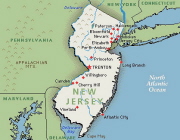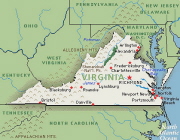What Do the New Jersey and Virginia Gubernatorial Elections Mean? (And Are They Predictors of Midterms?)

But is this necessarily so? What do the elections in New Jersey and Virginia mean outside of these respective states? And how does the popularity of newly elected presidents seem to impact these races?
A Smart Politics analysis of historical election returns in the Garden and Old Dominion States finds that the two states have voted in tandum during the last five gubernatorial elections dating back to 1989 – and always electing the party which is not in control of the White House.
This is not good news for Democratic New Jersey Governor Jon Corzine, who is fighting tooth-and-nail with Republican Chris Christie with independent Chris Daggett in the low double-digits.
Democrats swept the 1989, 2001, and 2005 elections in these two states – and were able to do so both when Republican Presidents were popular (George H.W. Bush at 57 percent approval on Election Day in 1989; George W. Bush at 84 percent in 2001) as well as unpopular (Bush at 42 percent approval in 2005).
Republicans, meanwhile, swept the 1993 and 1997 gubernatorial contests in the two states while Bill Clinton was in office – at both unpopular (in 1993, at 48 percent) and popular (in 1997, at 57 percent) periods of his presidency.

Gubernatorial success by a political party in these states seems to be inversely correlated with the party controlling the White House and not correlated to the President’s popularity, as such approval ratings have not demonstrated to be associated consistently with electoral success or failure of his party in gubernatorial elections in New Jersey and Virginia over the past 20 years.
And if there is a party sweep (by the GOP) on Tuesday, what does that tell us about how the midterm U.S. House elections will turn out in 2010?
Not much.
When the Democrats swept the gubernatorial contests in 1989 and 2005, they gained U.S. House seats in the following year’s midterm elections (+7 and +31 seats respectively). However, after the Democrats swept the two races in 2001, they went on to lose 8 seats in the 2002 midterms.
As for the GOP, their sweep through New Jersey and Virginia in 1993 was followed by the 54-seat gain in the U.S. House in the 1994 Republican Revolution. However, their 1997 sweep was followed by a loss of 5 seats to the Democrats in 1998.
It should be noted that the Garden and Old Dominion States have not always voted in unison in gubernatorial elections. Democrats and Republicans each claimed one state in the elections of 1973, 1977, 1981, and 1985.
Follow Smart Politics on Twitter.

It would appear that at this point in time, folks are tired of both the two major parties. I believe that this might create a better opportunity for independent candidates in the near future.
Quite a few folks are feeling very Perot like at the moment. What this phenomena could lead to, will play out in the very near future. Long term it doesn’t bode well for either party, short term for the democrats.
Do the terms liberal and conservative today mean anything other than slightly different shades of statist?
Originally liberal meant someone who stood for liberty, but now it describes those favoring the welfare state more than the warfare state promoted by conservatives.
Similarly, the etymology of conservative indicates attachment to the status quo, but the status quo is now the welfare/warfare state. So today’s liberal power elites are very conservative: their principal motivation is self-perpetuation.
No wonder the liberal-conservative division makes no sense but that what really counts is the politics of patronage.
Election Results. Nov.3,2009
November 6, 2009 by politicalsnapshots.wordpress.com
Election Results. Nov.3, 2009
The election results of Nov. 3, 2009 in Virginia, New Jersey and New York, will not give us a conclusive answer as to the resurgence of the Republican Party, nor the coming demise of the Democratic Party. At the same time, not paying attention to certain clues will be politically futile.
Few reasons for Democratic Party loss.
* Low voter turn out in historically Democratic strongholds.
* High unemployment, (in spite of 10,000 points at the Dow and so-called economic growth ballyhoo.)
* The disappointment of the progressive forces that helped put Obama in the White House. (Especially young white voters). Disparity between campaign rhetoric and reality.
* The uncertain, dim future of the U.S. economy.
* The unpopularity of the wars in Iraq and Afghanistan and,
* The Health Care Reform drama. (“not bound by any time lines” Sen. Reid)
For the time being, the Democrats might take third party candidates, as in (New York 23rd District) as their friends who might weaken the Republican Party. But, third party candidates are a double edged sword. In the future, progressive local candidates could arise challenging the status quo within the Democratic Party.
In other words, it will not be hard to envision for Conservatives and Progressives running their own candidates. After all, the rise of independents is based in the awareness that the two major political parties in the U.S. are not in step with the needs of the majority of the people. It is also an acknowledgment that the two party monopoly of politics is not conducive for democracy.
Finally, as my dear friend Ashley St.Claire says, “ may be, just may be, the so-called “ Blue Dogs”, ( I don’t know about the color but, the second part, they might be, if they call themselves one) might have a better fit in the Republican Party.”
Professor Mekonen Haddis